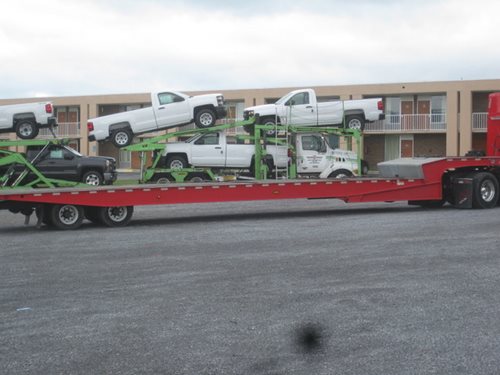 |
| Dry van trailers can be specialized just like other forms of trailers . |
Today I was driving up the road and I noticed a brand new what appeared to be a 45’ 96” wide dry van trailer. Freightliner Columbia with a 52” sleeper sitting atop all wide base single tires with aluminum rims. I said hum and it was obvious this particular combination was put together for maximum payload of weight not interior volume/cube.
We often noticed specialized trailers for hauling oversized loads and other commodities. However how often is the regular dry van reefer or flatbed thought of in this manner? Yes, there are different construction types of dry vans suitable for transporting different commodities using strengthening components such as; sheet and post, plate, and fiberglass reinforced plywood (FRP). A good bit of consideration goes into tie downs logistic posts and mounting points within the dry van. Also, a lot of attention goes into having maximum available space within the trailer.
As I thought about this brand new 45’ 96” wide trailer I began to think of the advantages this trailer would have over what is often considered the standard 53’ 102” wide trailer dry van in use today. This type of trailer could actually haul more dense products like canned soup, soda, bottled water as these products are heavy and will max out the weight before they will use all of the 53” trailers interior volume. The 45’ trailer would have a lighter tare weight and also narrower which would cut down on aerodynamic drag enabling a heavier pay load and receive good fuel mileage. If put into service with the right customers this combination would have distinct advantages over the more common universally accepted larger and heavier 53’ 102” wide dry van trailers.
The dangers of this specialized trailer is that it would need to stay in this kind of service to remain viable in the market place. This same trailer would also need to be used to the end of its serviceable life as the resale value would be less than a comparable trailer of more common dimensions. There are many factors that need to be considered before ordering any piece of equipment which is not in the main stream of the market place. The first area of consideration would be the long-term sustainability of the market destined to be served. If the market did not remain viable you would be left with a piece of equipment that could be worth little more than scrap metal value. The same things could apply to many other types of trailers especially flatbed trailers that are only hauling brick or coils.
The smaller the trailer, the lighter the tare weight, makes for more payload in regards to weight. There’s advantages to being very specialized and finding a niche, before taking the leap. Check to make sure there is volume of business because what is considered an advantage could quickly become a disadvantage if the freight you were transporting ceased to exist. There have probably been trailers built to haul one load and then scrapped because they could only transport that one very specialized shipment. In this case, the trailer would be built into the price of the load. Thinking about this the price of a trailer is always put into the price of a load only over a longer time.